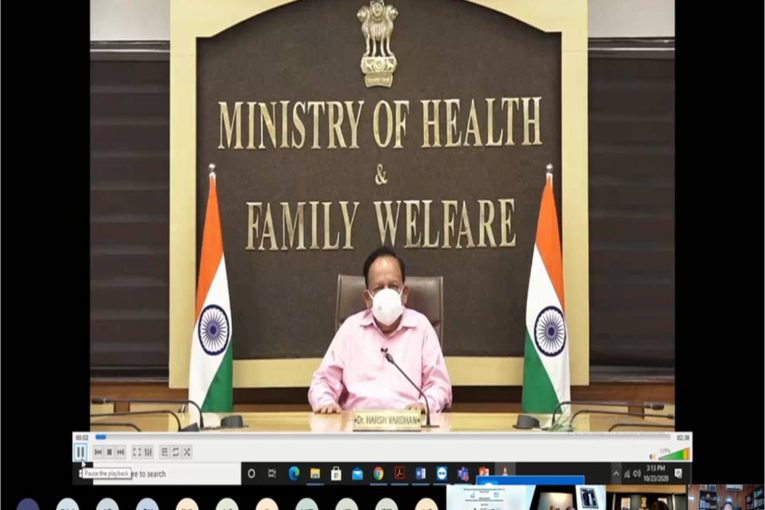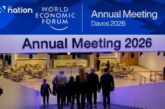
India Water Foundation in collaboration with United Nations Environment Programme organized a high-level webinar on “The Future of Liquid Waste Management amidst COVID-19: What lies ahead” on 23rd October 2020 at 3 PM (IST) onwards. The objective of the webinar contributed to the holistic understanding on various facets of liquid waste management in the context of COVID-19. Effective waste management to scale up innovative solutions through sustainable approaches with a mandate to reduce, recycle and rethink solutions & prioritize action at source rather than on downstream pathways was deliberated and discussed.Around 100 participants gathered on board ranging from policy makers, practitioners and technical experts, professionals, UN and international agencies, development partners involved in waste management, bio-medical waste, sewage, finance and circular economy, civil society organizations, academia etc

‘Effective management of biomedicalwaste fits well in priority areas of protecting environment & health’ highlighted Dr. Harsh Vardhan, Union Minister of Health and Family Welfare, Minister of Science and Technology, Minister of Earth Science, Government of India while delivering the Chair address of the session. The host Dr. Arvind Kumar, President, India Water Foundation spoke about need for customized solutions needed for waste management in clean & green way through integrated systems approach. Mr. Atul Bagai, Head, UNEP India highlighting the close link between pandemic, wastewater and sanitation expressed his concern to break the chain of transmission due to increasing waste accumulation.
Prof. Ashutosh Sharma, Secretary, Ministry of Science and Technology, GoI spoke about the nexus between food, health, water and environment delivering the key policy address while Mr. U.P. Singh, Secretary in the Department of Water Resources, River Development & Ganga Rejuvenation, Ministry of Jal Shakti raised a concern towards Sewage treatment-data highlighting theamount of waste generation& treatment amidst COVID-19. The entire webinar was anchored by Ms. Shweta Tyagi, Chief Functionary, India Water Foundation.
The webinar was organised to also understand the technical implications posed due to the sudden onset of the COVID-19 pandemic in early 2020 resulting in massive health and economic burdens. Amongst all the category of bio-medical waste, liquid wastes posed a serious threat to human health and the environment because of their ability to enter watersheds, pollute ground water, and drinking water when improperly handled and disposed. In this regard, technical session was held to address the broader aspects of engineering solutions to waste management. Ms. Payden, WHO Representative set the foundation tone of the session and experts like Dr. Muralee Thummarukudy, Chief of Disaster Risk Reduction, UN Environment Programme and Dr. Mushtaq Ahmed Memon working with United Nations Environment Programme as Regional Coordinator for Resource Efficiency in Asia Pacific Office expressed their technical opinions and strategies to combat this menace.
Further, B Vinod Babu, Director, CPCB; Dr. Rajnarayan R. Tiwari, Director of ICMR-NIREH and Mr. Swapan Mehra, Vice President (Waste to Wealth), Invest India highlighted the endeavours taken by the respective organisation towards waste management in the country. Experts highlighted the rules/ guidelines from CPCB/ concerned authorities for the management of liquid waste from healthcare facilities (HCFs) / Isolation Wards in addition to non-COVID waste to leveragingthe potential to convert waste to wealth.
Key Recommendations:
- Understand data as the ‘New Water’ andstreamline ‘data’ linked to COVID-19 waste managementby developing better response strategies to tackle waste emergencies.
- Urban Water augmentation must be optimized for water Use, Re-Use,Recycle and Recovery via Circular Economy model
- Nexuses hold a central key intervention to inter-linking water, energy, health,and environment in our fight against the pandemic
- Liquid waste consisting of black and grey water must be treated at Source with appropriate technologies and interventions with equal focus on the ‘causable factors’
- From public health view, the chain of sanitation must begin from access to toilets to waste treatment & management and finally the safe disposal
- With pandemic putting a load on the river systems, testing and monitoring is significant towards early detection of contamination trends.
We are thankful to the Excellency, dignitaries, speakers and virtual audience for attending the high level webinar and making this event enriching and memorable. IWF in collaboration with UNEP brought forth for the first time distinct and diverse perspectives on bio-medical waste and are overwhelmed by your support and responses received from corners of the world.
Link to the webinar recording: https://youtu.be/nm_5lYXrZF4



